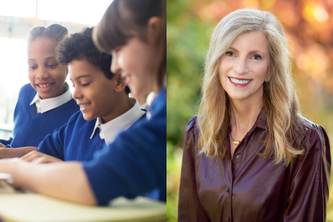
Summer vacation is just around the corner. While most students take a break from school, experts say it's important to keep books in the hands of learners. The loss of reading skills over the summer can build up over time, resulting in lower reading proficiency as students progress through their schooling years.
Lori Helman with the University of Minnesota’s College of Education and Human Development explains what summer reading loss is and how parents and educators can work together to help children overcome it.
Q: What is summer reading loss?
Prof. Helman: When students read during the summer months, they typically gain an average of a month of reading achievement. However, students who do not read during this time lose two months of reading achievement. This yearly process of summer loss continues to add up throughout elementary and middle school. It accounts for a large proportion of differences in student reading achievement. Summer reading loss is particularly significant among students living in poverty.
Q: What is the most common approach to addressing summer reading loss?
Prof. Helman: Educators often take the approach of handing over a recommended summer reading list. While this may support some students, it doesn’t fully support students who lack access to reading materials. An obstacle for summer reading is not having books and other kinds of materials available to children at home. When students don’t have access, it limits their reading practice and affects their academic achievement. To address this, students should be given books they can keep for the entire summer. Research shows book ownership — rather than lending programs — contributes more to changing attitudes towards reading, increasing the amount of reading and development among children.
Q: Can students be given any books, or are certain books better than others?
Prof. Helman: It’s not as much about the type of book, as it is about who chooses it. Choice is one of the most important factors in determining that books will be read. Children who are given a choice of books have demonstrated twice the reading gains compared to children who were not. When providing options, gather a wide range of options in topics, genres and reading levels. Educators looking for a wide variety of books to give students can explore The American Library Association, Reading Rockets and We Need Diverse Books summer reading lists.
Q: How can parents better encourage their kids to read this summer and prevent summer reading loss?
Prof. Helman: Some parents wonder if they are qualified to support their children’s reading, while others focus too heavily on reading accuracy or completing workbooks at the expense of reading for meaning and enjoyment.
Three things parents can do are support engagement with texts is by showing a natural curiosity about what children are thinking about and enjoying, sharing their own reading with their children, and helping children access books. Low cost books can be found at garage sales, flea markets, library used book sales and such.
Another way to support reading is to provide a space for it in the family schedule. This might involve turning off the television and other electronics during a certain time of the day and having a “reading time” for everyone. Older children also enjoy reading to younger children and reading easy books is good practice for developing fluency and expression.
Finding books and other reading materials that feed children’s curiosity, help them explore unknown worlds, or provide opportunities to reflect on their lives and interpersonal relations are some of the ways students develop a motivation to read. This internal motivation is much more powerful than external approaches, such as using points or goals, which can often lead to negative and unintended consequences by positioning reading as an unpleasant task.
Q: What is your current research focused on in the area of reading and literacy education?
Prof. Helman: I study how elementary-aged students develop as readers and writers — from their first steps pretending to read and scribbling to their blossoming as capable, thoughtful and expressive readers and writers. In particular, I look at how this development can be supported for emergent bilingual students who speak a home language and learn English as a new language at school. Currently, I am researching and writing about how instructional leaders can best foster the success of students who bring many types of language resources with them to school through school-wide approaches and teaching strategies.
Lori Helman is a professor of literacy education in the Department of Curriculum and Instruction and the director of the Minnesota Center for Reading Research at the University of Minnesota College of Education and Human Development. Her research interests include the educational needs of students learning English as a new language and literacy development of students from a variety of cultural and linguistic backgrounds.
About “Talking...with UMN”
“Talking...with UMN” is a resource whereby University of Minnesota faculty answer questions on current and other topics of general interest. Feel free to republish this content. If would like to schedule an interview with the faculty member or have topics you’d like the University of Minnesota to explore for future “Talking...with UMN,” please contact University Public Relations at [email protected].
- Categories:
- Education





